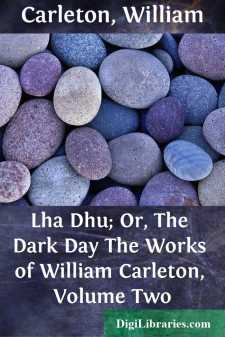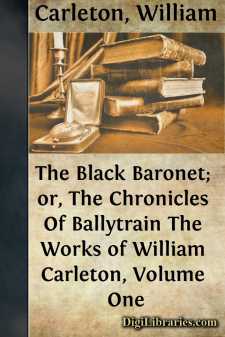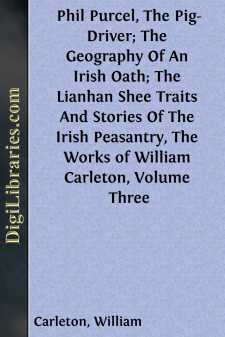Categories
- Antiques & Collectibles 13
- Architecture 36
- Art 48
- Bibles 22
- Biography & Autobiography 813
- Body, Mind & Spirit 142
- Business & Economics 28
- Children's Books 15
- Children's Fiction 12
- Computers 4
- Cooking 94
- Crafts & Hobbies 4
- Drama 346
- Education 46
- Family & Relationships 57
- Fiction 11828
- Games 19
- Gardening 17
- Health & Fitness 34
- History 1377
- House & Home 1
- Humor 147
- Juvenile Fiction 1873
- Juvenile Nonfiction 202
- Language Arts & Disciplines 88
- Law 16
- Literary Collections 686
- Literary Criticism 179
- Mathematics 13
- Medical 41
- Music 40
- Nature 179
- Non-Classifiable 1768
- Performing Arts 7
- Periodicals 1453
- Philosophy 64
- Photography 2
- Poetry 896
- Political Science 203
- Psychology 42
- Reference 154
- Religion 513
- Science 126
- Self-Help 84
- Social Science 81
- Sports & Recreation 34
- Study Aids 3
- Technology & Engineering 59
- Transportation 23
- Travel 463
- True Crime 29
Lha Dhu; Or, The Dark Day The Works of William Carleton, Volume Two
by: William Carleton
Categories:
Description:
Excerpt
There is no country in the world whose scenery is more sweetly diversified, or more delicately shaded away into that exquisite variety of surface which presents us with those wavy outlines of beauty that softly melt into each other, than is that of our own green island. Alas! how many deep valleys, wild glens, green meadows, and pleasant hamlets, lie scattered over the bosom of a country, peopled by inhabitants who are equally moved by the impulses of mirth and sorrow; each valley, and glen, and pleasant hamlet marked by some tearful remembrance of humble calamity of which the world never hears. How little do its proud nobility know of the fair and still beauty which marks the unbroken silence of its most delightful retreats, or of the unassuming records of love or sorrow, which pass down through a single generation, and are soon lost in the rapid stream of life. We do not love to remember sorrow, but its traces, notwithstanding, are always the most uneffaceable, and, what is strange as true, its mournful imprint remains ever the longest upon the heart that is most mirthful. We talk not now of the hollow echo, like mirth, which comes from thousands only because the soul is wanting. No; but we say that as the diamond is found in the darkness of the mine, as the lightning shoots with most vivid flashes from the gloomiest cloud, so does mirthfulness frequently proceed from a heart susceptible of the deepest melancholy. Many and true are the simple tales of Irish life which could prove this. Many a fair laughing girl who has danced in happiness, light as a mote in the sunbeam, has been suddenly left in darkness, bowed down in youth and beauty to the grave, and though the little circle of which she was the centre may have been disturbed by her untimely life, yet in brief space, except to a few yearning and stricken hearts who could not forget her who was once their pride and hope, her Memory has passed away like a solitary bird, viewed as it goes over us, and followed wistfully, by the eye, until by degrees it lessens and lessens—becomes dim—then fades into a speck, and ultimately melts into the blue distance of heaven. One such a "simple annal," brought about by the inscrutable hand that guides the destinies of life, we are now about to present to our readers. Were it the mere creation of our fancy, it might receive many of those embellishments at our hand with which we scruple not to adorn the shadowy idealities of fiction.
It is, however, one of those distressing realities so often produced by the indulgence of vehement passion, that we are compelled by the melancholy severity of its truth to give the details of, not, alas, as we could have wished them to happen, but simply as they occurred.
The village of Ballydhas was situated in the bosom of as sweet a valley as ever gladdened the eye and the heart of a man to look upon. Contentment, peace, and prosperity, walked step by step with its happy inhabitants. The people were marked by a pastoral simplicity of manners, such as is still to be found in some of the remote and secluded hamlets of Ireland. The vale was green and shelving, having its cornfields, its pasturage, and its patches of fir, poplar, and mountain-ash intermingled, and creeping up on each side in wild but quiet beauty to the very mountain tops that enclosed it. At the head of the glen reposed a small clear sheet of water, as calm and unruffled as the village itself. By this sweet lake was fed the pure stream which murmured down between the banks, here and there opened, and occasionally covered by hazel, black-thorn, or birches. As it approached the village the scenery about it became more soft and tranquil. The banks spread away into meadows flower-spangled and green; the fields became richer; the corn waved to the soft breezes of summer; the noon-day smoke of the dinner fires rose up, and was gently borne away to the more wide-spread scene of grandeur and cultivation that lay in the champaign country below it. On each side of the glen were masses of rock and precipices, just large enough to give sufficient wildness and picturesque beauty to a view which in itself was calm and serene. In the distance about a mile to the north, stood out a bold but storm-vexed headland, that heaved back the mighty swell of the Atlantic, of which a glimpse could be caught from an eminence above the village. Nothing indeed could be finer than the booming fury of the giant billows, as they shivered themselves into spray, and thundered around the gloomy caverns of the headland, especially when contrasted with the calm sense of peace and security which reposed upon the neat white village in the glen.
How sweet of a summer Sabbath morning to sit upon the brow of this delightful valley, and contemplate in the light dreams of a happy heart its humble images of all that is pure, and peaceful, and soothing in life; the little bustle of preparation for the cheerful but solemn duties of the day; the glad voices of bright-faced boys and girls, eager to get on their Sunday clothes; the busy stirring about of each tucked-up matron, washing, and combing, and pinning her joyous little ones; and the contented father now dressed, placidly smoking his after-breakfast pipe, looking upon their little cares, and their struggles for precedence in being decked out with their humble finery; now rebuking an elder boy for his impatience and want of consideration in not allowing his juniors to get first dressed, and again soothing a younger one until his turn came....












